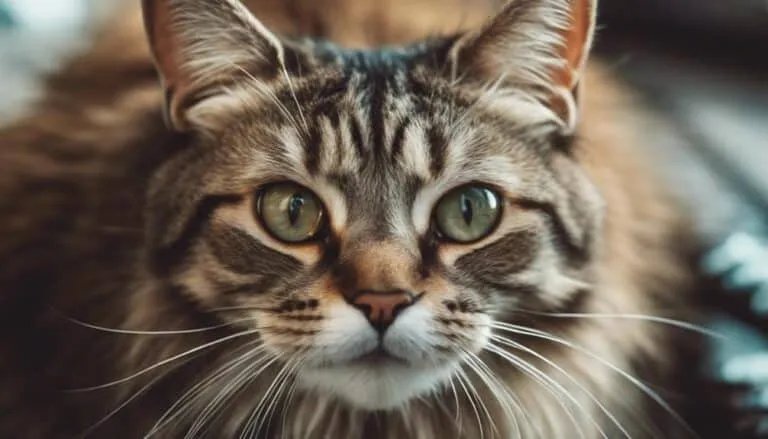The Best Fluffy Pancakes recipe you will fall in love with. Full of tips and tricks to help you make the best pancakes.

Cats, those enigmatic and independent creatures that share our homes, possess a remarkable ability that continues to fascinate scientists and cat lovers alike. It is a power that goes beyond their playful antics and soothing purrs.
Cats have an uncanny knack for sensing and soothing human emotions, almost as if they possess a sixth sense. But how do they do it? What is the secret behind their intuitive understanding of our moods?
In this article, we will explore the fascinating world of feline empathy, uncovering the mysterious ways in which cats connect with our emotions and provide us with comfort and solace.
Prepare to be amazed as we unveil the extraordinary power of cats and their incredible ability to sense and soothe human emotions.
Key Takeaways
- Cats have the ability to sense when their owners are depressed or experiencing anxiety.
- They pay attention to emotional signals and changes in behavior to determine their owners' emotional state.
- Cats use social referencing to understand how they should react to stimuli.
- Cats can be excellent emotional support animals, providing therapeutic benefits and helping to reduce loneliness.
Cats' Sensing Abilities
Cats possess remarkable sensing abilities that enable them to detect and respond to human emotions with a unique blend of intuition and empathy. These abilities have made cats valuable companions in therapy and have had a positive impact on mental health.
Cats have been known to sense when their owners are depressed or anxious by paying attention to emotional signals such as a listless voice or facial expressions. They also notice changes in behavior, such as staying in bed for extended periods. Cats use social referencing to determine how their owners feel, looking at their reactions to stimuli to decide how they should react.
Additionally, cats form social ties with their owners and other family members, recognizing emotions through visual and auditory observations. Their healing purrs and ability to provide distraction from negativity make them excellent emotional support animals. Owning a cat can help reduce loneliness, lower blood pressure, and reduce the risk of heart attacks, all of which are beneficial for those struggling with anxiety and depression.
Adopting a cat from a local shelter can provide comfort and support for those feeling anxious or blue.
Emotional Signals and Behavioral Changes
With their remarkable sensing abilities, cats can detect and respond to emotional signals and behavioral changes in their owners, providing a unique blend of intuition and empathy that contributes to their role as valuable companions in therapy and support for mental health.
Cats pay close attention to their owners' emotional state, recognizing signs of depression and anxiety. They observe changes in behavior, such as prolonged periods of staying in bed or displaying a listless voice and facial expressions. Cats utilize social referencing to gauge their owners' emotions, observing their reactions to stimuli in order to determine how they should react.
This sensitivity and attentiveness to human emotions allow cats to form social ties and provide emotional support. The effects of cat ownership on mental health have been well-documented, with cats offering therapeutic benefits such as reducing blood pressure and alleviating feelings of loneliness.
The importance of the human-animal bond cannot be underestimated, as it plays a significant role in promoting emotional well-being and providing comfort during times of distress.
Social Referencing and Mirroring Behavior
When it comes to understanding and responding to their owners' emotions, cats demonstrate a remarkable ability to engage in social referencing and mirror behavior.
They have the innate capacity to observe and interpret their owners' emotional signals, such as facial expressions and vocal tones, to determine their emotional state. By paying close attention to changes in their owners' behavior and body language, cats gather valuable information about their emotions.
Moreover, cats utilize social referencing by looking at their owners' reactions to different stimuli as a guide for their own behavior. This mirroring behavior in cats allows them to empathetically respond to their owners' emotions, providing comfort and support in times of distress.
Through their adept social referencing and mirroring behavior, cats establish a strong emotional connection with their owners, making them wonderful companions for emotional well-being.
Recognition of Human Emotions
Through their keen observation skills and innate understanding of nonverbal cues, cats possess the remarkable ability to recognize and interpret human emotions. Their cognitive abilities allow them to perceive changes in behavior, body language, and facial expressions, enabling them to identify emotions such as happiness, sadness, fear, or anxiety in their owners.
Cats exhibit empathy by responding to these emotions appropriately, whether it be through comforting behavior, providing a sense of companionship, or simply being present. Studies have shown that cats can mirror their owners' anxiety, further emphasizing their ability to recognize and respond to human emotions.
This empathetic nature makes cats excellent emotional support animals, as they can provide a sense of calm, reduce stress, and offer companionship to individuals experiencing depression or anxiety. Understanding and acknowledging the recognition of human emotions in cats is crucial in appreciating the significant role they can play in enhancing our emotional well-being.
Healing Powers of Cats
Cats possess remarkable healing powers that have been scientifically proven to enhance emotional well-being and provide therapeutic benefits to individuals experiencing depression or anxiety. These furry companions offer more than just cuddles and companionship; they have a profound impact on our mental health.
Here are three key ways in which cats contribute to healing:
- Healing sounds: The soothing purring of cats has been shown to promote relaxation and reduce stress levels. The rhythmic vibrations emitted by their purrs have a calming effect on the human nervous system, helping to alleviate anxiety and promote a sense of tranquility.
- Calming presence: Cats have a natural ability to create a serene and peaceful environment. Their gentle and non-judgmental nature provides a sense of comfort and security, allowing individuals to feel understood and supported during times of emotional distress.
- Emotional support: Cats are intuitive creatures that can sense when their owners are feeling down or anxious. They offer unconditional love and companionship, providing a source of emotional support that can alleviate feelings of loneliness and isolation.
Incorporating these healing powers into our lives can have a profound impact on our emotional well-being, offering a sense of solace and comfort during difficult times.
Cats as Emotional Support Animals
The role of cats as emotional support animals is increasingly recognized for their therapeutic abilities in alleviating symptoms of anxiety and depression. Cats have the potential to provide immense emotional support to individuals struggling with mental health issues. They possess unique qualities that make them excellent support animals, such as their ability to lower blood pressure and reduce the risk of heart attacks.
Cats also have the power to distract their owners from negative thoughts and behaviors, ultimately reducing loneliness and providing companionship. However, it is important to acknowledge that owning a cat may not be suitable for everyone. Potential drawbacks include allergies, financial responsibilities, and the need for proper care and attention.
In such cases, alternative support animals, such as dogs or rabbits, can also provide the necessary emotional support. It is crucial to carefully consider individual needs and circumstances when choosing an emotional support animal.
Therapeutic Benefits for Owners
Owning a cat can provide therapeutic benefits for individuals struggling with anxiety and depression. Cats have been observed to have a profound impact on the mental well-being of their owners. Here are three therapeutic effects of owning a cat:
- Emotional support: Cats have the ability to sense their owners' emotions and provide comfort during difficult times. Their presence alone can bring a sense of calm and reduce feelings of anxiety and depression.
- Stress reduction: Interacting with a cat has been shown to lower stress levels and promote relaxation. The act of petting a cat can release endorphins and decrease the production of stress hormones, contributing to a greater sense of well-being.
- Companionship: Cats offer unconditional love and companionship, which can alleviate feelings of loneliness and isolation. Having a cat to care for provides a sense of purpose and responsibility, fostering a positive mindset.
Reducing Loneliness and Encouraging Care
One of the notable benefits of having a feline companion is the potential to alleviate feelings of loneliness while fostering a sense of care and responsibility.
Cats have a unique ability to provide companionship and promote self-care. Research has shown that owning a cat can significantly reduce feelings of isolation and loneliness, particularly for individuals living alone or facing social challenges. The presence of a cat can provide comfort and emotional support, helping to create a sense of connection and belonging.
Furthermore, caring for a cat requires a certain level of responsibility, which can be beneficial for individuals struggling with self-care. Engaging in daily activities such as feeding, grooming, and playing with a cat can provide a sense of purpose and routine, contributing to overall well-being.
Adopting a Cat for Emotional Well-being
Adopting a cat can have a profound impact on emotional well-being, providing a source of comfort and companionship for those seeking support in their daily lives. The feline companionship offered by a cat can offer numerous mental health benefits.
Here are three key reasons why adopting a cat can be beneficial for emotional well-being:
- Unconditional Love: Cats are known for their ability to provide unconditional love and acceptance. Their presence can help alleviate feelings of loneliness and offer a sense of companionship, which is essential for emotional well-being.
- Stress Reduction: Interacting with a cat has been shown to reduce stress levels by triggering the release of oxytocin, a hormone associated with relaxation. This can help individuals manage anxiety and depression more effectively.
- Emotional Support: Cats have a unique ability to sense their owner's emotions and offer comfort during difficult times. Their presence can provide a source of emotional support, helping individuals cope with stress, sadness, and other challenging emotions.
About the Author
Misty Layne, a resident of small-town Alabama, is an experienced writer with a passion for animals, particularly cats. She has dedicated her time to understanding the intricate bond between cats and humans, exploring their remarkable ability to sense and soothe human emotions.
Misty's hobbies and interests encompass a diverse range of activities, including playing the piano and indulging in her favorite indie films. In her writing, Misty adopts a scientific and informative approach, providing readers with valuable insights into the emotional support and healing powers that cats possess.
Her empathetic nature shines through as she delves into the topic, seeking to shed light on the positive impact cats can have on individuals struggling with anxiety and depression. Through her words, Misty aims to inspire others to consider adopting a cat from a local shelter, recognizing the potential benefits it can bring to their emotional well-being.
Conclusion
In conclusion, cats possess a remarkable ability to sense and soothe human emotions.
Through their keen awareness and observation of their owners' behavior, vocal tone, and facial expressions, cats can detect signs of depression and anxiety.
They form social ties and recognize emotions, providing therapeutic benefits such as healing purrs and distraction from negativity.
By reducing blood pressure, lowering the risk of heart attacks, and alleviating feelings of loneliness, cats serve as valuable emotional support animals.
Consider adopting a cat to enhance your emotional well-being.








